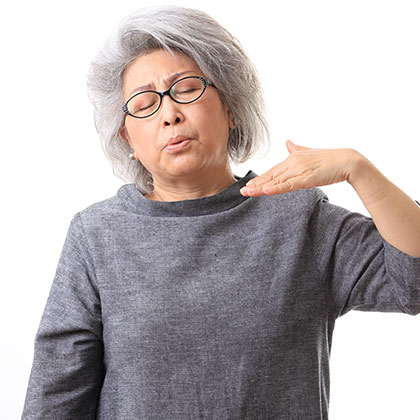
Everybody does it – though some people do it more than others. But what is sweating exactly, and what purpose does it serve? There are millions of sweat glands found in the human body. These fall into two main types: eccrine glands and apocrine glands.
Eccrine glands are found nearly all over your body, within the deep layers of your skin, where they connect to the outer layer of your skin via ducts. These glands are stimulated by the nervous system to produce sweat – a clear, odourless fluid – when your body temperature rises. Sweat from the eccrine glands is made mainly from water along with other substances such as sodium and chloride. Eccrine sweat glands account for about three quarters of your body’s sweet glands. The remaining quarter are mainly made up of apocrine sweat glands. These are mostly found in areas with lots of hair follicles, including your armpits and your groin.
Meanwhile apocrine glands are thought to secrete fluid as a response to anxiety, nervousness and other types of emotional stress (experts believe they are stimulated by hormones rather than the nervous system, since they only start to function at puberty when they are stimulated by sex hormones (i) ). Like the fluid produced by eccrine glands, this fluid is odourless until it mixes with the bacteria on your skin.
Normal function
Many people may find sweating embarrassing, but it’s a completely normal function of the body. As well as helping to cool you down when you get too hot – which is very useful when you exercise, for instance – some also believe it helps remove toxins from the body (ii). How much you sweat will depend on a number of factors, including your gender, age, genetics, fitness level or whether or not you’re overweight.
If, however, you find sweating is a problem, there are a few things you can do to try and manage it, including the following:
-
Avoid things that you know make your sweating worse (spicy foods, caffeine, smoking and alcohol are all thought to trigger sweating in some people).
-
Avoid man-made fibres that make you sweat, such as nylon and polyester. And go for cool, loose clothing instead of wearing anything tight.
-
Try an antiperspirant spray rather than using a deodorant (deodorants simply mask the smell of odour, whereas antiperspirants minimise sweat production).
Hyperhidrosis: extreme sweating
While sweating may only be a minor problem for most people, around three in every 100 people in the UK is affected by excessive sweating, or hyperhidrosis. This can affect just certain parts of the body such as hands, feet, face and armpits (focal hyperhidrosis) or it can affect you all over (generalised hyperhidrosis).
Focal hyperhidrosis – also called primary hyperhidrosis – has no obvious cause, though generalised hyperhydrosis (or secondary hyperhidrosis) may be linked to an underlying health problem or may be a side effect of taking certain medicines.
Family connection
Around one in four people with focal hyperhidrosis is thought to have the condition running in their family. But if you have generalised hyperhidrosis, it could be caused by one of several things, including menopause, an overactive thyroid gland, taking recreational drugs and drinking excessive amounts of alcohol. Medicines that may cause generalised hyperhydrosis include some antidepressants, tamoxifen (a breast cancer drug) and gonadotropin-releasing hormone antagonists (drugs used to treat prostate cancer in men and infertility in women).
So if you sweat excessively, it's advisable to see your GP to rule out any possible underlying causes. Your GP can also tell you about treatments that could help. For instance, they can prescribe powerful antiperspirants that contain aluminium chloride, though these types of antiperspirants can cause mild skin irritation. Medicines that block the effect of a chemical that activates the sweat glands are also available on prescription.
Hospital treatment
If you have severe hyperhydrosis, your GP may refer you to a hospital dermatologist who may recommend treatments such as iontophoresis (which passes a low-intensity current through your hands, feet or armpits), Botox (which works by blocking the nerve endings in your armpits), prescription drugs and – if all else fails – surgery.
If, on the other hand, your condition is milder, you may prefer to try a strong over-the-counter antiperspirant or an absorbent powder that soaks up excessive sweat. You can also buy sweat pads that absorb underarm moisture.
There’s lots more information about hyperhidrosis and the treatments that are available at hyperhidrosisuk.org.
The lowdown on night sweats
Sweating a lot when you’re in bed can happen to anybody every now and then, especially if your bedroom is too hot or you have too many blankets on your bed. Even if you wake up during the night drenched in perspiration – a condition called nocturnal hyperhidrosis – there may be no reason (when the cause of night sweats isn’t known, it’s called idiopathic hyperhydrosis). Thankfully, having night sweats is usually harmless.
But occasionally night sweats can be a sign of a medical condition or they may be triggered by certain medicines. The following are some of the things that may cause night sweats:
Menopause
As well as hot flushes, the hormonal changes that affect women experiencing the menopause can cause night sweats (these are basically hot flushes that happen at night). There are a number of other ways in which your body changes during menopause, read this article to find out more about how menopause can affect you.
Sleep apnoea
A condition that interrupts your breathing while you’re asleep, sleep apnoea is a result of your throat relaxing and narrowing, and is thought to affect around four per cent of middle-aged men and two per cent of middle-aged women in the UK (iv). Not everyone with sleep apnoea has night sweats, with more common symptoms including loud snoring, loud breathing and gasping for air or snorting while you’re asleep. Discover more about obstructive sleep apnoea here
Overactive thyroid
Also known as hyperthyroidism, overactive thyroid is a fairly common condition where the thyroid gland produces too much thyroid hormone, which makes your metabolism faster. If you have an overactive thyroid, you may be sensitive to heat and sweat more than normal, including at night.
Low blood sugar
Night sweats can also be associated with having hypoglycaemia, which is when your blood glucose level becomes too low. Hypoglycaemia is mostly seen in people who have diabetes, particularly if they take too much insulin or go for too long without food.
Infections
Certain infections can cause night sweats, including tuberculosis, endocarditis (inflammation of the heart valves), abscesses, HIV/AIDS and osteomyelitis (infection of the bone).
Excessive alcohol
Drinking too much alcohol can make you sweat more than usual. Sweating is also associated with misusing drugs, particularly heroin.
Prescription medicines
Night sweats can be a side effect of taking some medicines, including antidepressants, antipsychotics, some blood pressure medicines (antihypertensives) and antipyretics (medicines that help reduce a high body temperature such as paracetamol, ibuprofen and paracetamol).
If you are affected by night sweats on a regular basis, it may be a good idea to see your GP to rule out any underlying medical causes. Seeing your doctor may also help put your mind at rest if you’re worried.
How to tackle sweaty feet
Very few people have never experienced sweaty feet – it’s something that affects nearly all of us every now and then. If, however, your feet sweat more than normal most or all of the time, it can make you feel embarrassed and uncomfortable.
According to the College of Podiatry, feet tend to sweat more than other parts of the body as they contain around 250,000 sweat glands (v). Teenagers and young people under the age of 25 are the most likely to suffer from sweaty feet, as changing hormone levels can make sweat glands overactive.
The good news is there are lots of things you can do to keep those sweat glands under control:
-
Keep your feet as clean as possible by washing them every night before you go to bed using antibacterial soap and water.
-
Change your socks every day – choose cotton socks in summer and woollen ones in winter, as they may help prevent your feet from getting too hot and sweaty by absorbing moisture (alternatively, wear sports socks designed to absorb moisture).
-
Also wear a variety of different pairs of shoes instead of the same pair every day (this allows your shoes to dry out before you wear them again). Leather shoes are considered best, as they allow your feet to breathe (if you don’t wear leather, consider canvas shoes or shoes made from mesh fabrics).
-
Use foot deodorants, shoe sprays and odour-control or medicated insoles to keep your feet and shoes smelling fresh. You can also buy antibacterial socks that contain chemicals that prevent feet smelling.
-
Go barefoot at home whenever you can and during the summer try to wear open-toe sandals without socks as often as possible.
-
See your GP if you’re worried your feet sweat excessively – they may be able to offer you a strong antiperspirant on prescription or refer you to a hospital specialist for further treatment.
Natural support for sweating
If you have a problem with sweating as a result of anxiety or other forms of emotional stress, the following natural supplements may be useful as a means of supporting your nervous system:
L-Theanine
Stress is a well-known cause of anxiety. But help may be available from supplements containing an amino acid found mainly in tea called theanine, with studies suggesting it may help to reduce stress without causing drowsiness (vi).
Vitamin B
Several B vitamins are needed for healthy nerve function, while vitamin B6 is needed for the body’s production of neurotransmitters. These brain chemicals include serotonin and norpepinephrine, both of which are needed to regulate mood (an imbalance of serotonin is thought to play a part in the cause of anxiety). Taking a good-quality B complex supplement can help ensure you’re getting an adequate supply of each of the B vitamins.
Magnesium
Magnesium is widely recognised as an important mineral for nerve function. Some experts also believe your magnesium levels may become depleted if you’re feeling stressed (vii). There is also some evidence to suggest anxiety and stress symptoms may be reduced by taking a multivitamin and mineral supplement containing magnesium, calcium and zinc (viii).
Sage
Widely used by natural practitioners to treat menopausal symptoms such as hot flushes and night sweats, sage also has a well-established traditional use as a treatment for excessive sweating. Unfortunately, there’s been very little research into the benefits of sage for hyperhidrosis to date. However, a 2016 report by the European Medicines Agency discusses number of unpublished studies that claim sage has antihidrotic properties, which means it reduces or prevents sweating (ix).
Please note: sage supplements may not be suitable if you’re pregnant or breastfeeding (speak to your GP before using any herbal medicine during pregnancy and while breastfeeding).
We know that excessive sweating can be an uncomfortable experience, but remember that it is a completely natural, healthy process. Try the advice above if you continue to be worried about your sweat, and you should feel better in no time. In the meantime, find out about more common concerns, take a look at our health library.
References:
-
Anatomy, Skin Sweat Glands by Bonnie D Hodge and Robert T Brodell. Available online: https://www.ncbi.nlm.nih.gov/books/NBK482278/
-
Available online: https://www.organicconsumers.org/news/yes-you-do-sweat-out-toxins
-
Available online: https://patient.info/skin-conditions/excessive-sweating-hyperhidrosis
-
Available online: https://cks.nice.org.uk/obstructive-sleep-apnoea-syndrome#!backgroundSub:1
-
Available online: https://cop.org.uk/foot-health/common-foot-problems/sweaty-feet/
-
Juneja LR. et al., L-theanine – a unique amino acid of green tea and its relaxation effect in humans. Trends in Food Science & Tech. 1999;10:199-204.Available online: https://www.sciencedirect.com/science/article/abs/pii/S0924224499000448
-
Kimura. K, Ozeki. M, Juneja. LR, Ohira. H. L-Theanine reduces psychological and physiological stress responses. Biol Psychol. 2007;74(1):39-45. Available online: https://pubmed.ncbi.nlm.nih.gov/16930802-l-theanine-reduces-psychological-and-physiological-stress-responses/
-
Grases. G, Perez-Castello. JA, et al. Anxiety and stress among science students. Study of calcium and magnesium alterations. Magnes Res. 2006 Jun:19(2):102-6. Available online: https://pubmed.ncbi.nlm.nih.gov/16955721-anxiety-and-stress-among-science-students-study-of-calcium-and-magnesium-alterations/
-
Carroll. D, Ring. C, Suter. M, et al. The effects of an oral multivitamin combination with calcium, magnesium, and zinc on psychological well-being in healthy young male volunteers: a double-blind placebo-controlled trial. Psychopharmacology (Berl). 2000;150:220-225. Available online: https://pubmed.ncbi.nlm.nih.gov/10907676-the-effects-of-an-oral-multivitamin-combination-with-calcium-magnesium-and-zinc-on-psychological-well-being-in-healthy-young-male-volunteers-a-double-blind-placebo-controlled-trial/
-
Schlebusch L. et al., A Double-Blind, Placebo-Controlled, Double-Centre Study of the Effects of an Oral Multivitamin-Mineral Combination on Stress. S Afr Med J.;90(12):1216-23.Available online: https://pubmed.ncbi.nlm.nih.gov/11234653-a-double-blind-placebo-controlled-double-centre-study-of-the-effects-of-an-oral-multivitamin-mineral-combination-on-stress/
-
European Medicines Agency 2016 Assessment report on Salvia officinalis L., folium and Salvia officinalis L., aetheroleum. Available online: http://www.ema.europa.eu/docs/en_GB/document_library/Herbal_-_HMPC_assessment_report/2017/07/WC500231352.pdf
Related Posts
Disclaimer: The information presented by Nature's Best is for informational purposes only. It is based on scientific studies (human, animal, or in vitro), clinical experience, or traditional usage as cited in each article. The results reported may not necessarily occur in all individuals. Self-treatment is not recommended for life-threatening conditions that require medical treatment under a doctor's care. For many of the conditions discussed, treatment with prescription or over the counter medication is also available. Consult your doctor, practitioner, and/or pharmacist for any health problem and before using any supplements or before making any changes in prescribed medications.

Christine
Christine Morgan has been a freelance health and wellbeing journalist for almost 20 years, having written for numerous publications including the Daily Mirror, S Magazine, Top Sante, Healthy, Woman & Home, Zest, Allergy, Healthy Times and Pregnancy & Birth; she has also edited several titles such as Women’ Health, Shine’s Real Health & Beauty and All About Health.
View More



